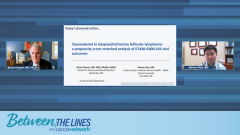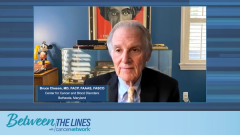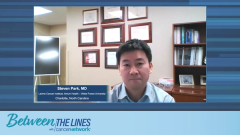
Key Takeaways: The Role of Tazemetostat in Relapsed/Refractory FL Moving Forward
Closing out their review of tazemetostat in R/R FL, participants consider its practical use in practice alongside other novel treatment modalities.
Transcript:
Bruce Cheson, MD, FACP, FAAAS, FASCO: How do you interpret this kind of analysis?
Steven Park, MD: I think this is a more fair comparison, again, and this is still not ideal, with the lack of any large sample size or randomized data. But matching the patients based on characteristics, that certainly helps to even things out. As you mentioned, the response rates were more comparable, although we still see higher response rates associated with the EZH2-mutated group, but as you [also] mentioned, the survival rates were fairly comparable between those 2 groups.
Bruce Cheson, MD, FACP, FAAAS, FASCO: Do you think it means that EZH2 [mutation status] doesn’t really matter?
Steven Park, MD: It’s hard to say. Obviously, it’s not definitive, but I don’t think it changes my practice because as I alluded, it’s FDA [U.S. Food and Drug Administration] approved for both groups. Regardless of the EZH2 mutation status, it is still FDA approved for using in relapsed/refractory follicular lymphoma. I think that’s the main reason, to be honest with you, why it’s approved for both groups because the study was not conclusive. I believe this analysis [may be] included in future trials, so we still have to wait for additional data. But just based on this matched analysis, I would say certainly the mutational status of EZH2 should not be a deciding factor if you decide to use tazemetostat.
Bruce Cheson, MD, FACP, FAAAS, FASCO: What are the remaining unmet needs in the relapsed/refractory follicular lymphoma space?
Steven Park, MD: I think there’s still a great need with more aggressive types of follicular lymphomas, higher grade, so grade B, and we talked about POD24 [progression of disease within 24 months, and especially transformed lymphoma. We don’t have great options for this aggressively behaving follicular lymphoma, so I think you still need better treatment options for these, although CAR [chimeric antigen receptor] T-cell therapy appears to be more promising in this area.
Bruce Cheson, MD, FACP, FAAAS, FASCO: There are some other interesting therapies also in development, such as the whole cluster of bispecifics, which seem to be quite active in follicular lymphoma, and unlike CAR T will be right off the shelf when they are available.
Steven Park, MD: I agree. I think it’s a matter of time before we start seeing those bispecific antibodies being FDA approved. We’re still waiting for additional data and the assessment by the FDA, but just based on the data being presented at different meetings, certainly, the response rates are very high with bispecific antibodies such as mosunetuzumab.... And patients who respond, they have excellent duration of response. It’s hard to say whether those treatments will be able to replace stem cell transplant and/or CAR T, but overall, I think they have more favorable adverse effect profiles compared to stem cell transplant or CAR-T therapy.
Bruce Cheson, MD, FACP, FAAAS, FASCO: I think those are the studies, bispecifics alone and in combination with other targeted drugs, that I’m really excited about and am looking forward to the results.
Are there any other studies that are ongoing for which you are really anticipating the results?
Steven Park, MD: Yes, there is a phase 3 study of rituximab plus lenalidomide with or without tazemetostat in relapsed/refractory follicular lymphoma. Results of the phase 1 portion of the study were presented at ASCO [American Society of Clinical Oncology annual meeting] this year. This combination appeared very promising, with an overall response rate of 98% and a CR [complete response] rate of 51%, regardless of their EZH2 mutation status. In this study, about 80% of the patients were EZH2 wild type. The fact that the overall response rate was over 95%, again, is very promising for both EZH2 mutated and wild-type groups. In terms of the safety of combining tazemetostat with rituximab-lenalidomide, [that] appeared overall well tolerated with no unexpected serious adverse effects. Now the phase 3 portion is going on, so it will be exciting to see those results.
Bruce Cheson, MD, FACP, FAAAS, FASCO: Thank you for sharing that information.
I think we’re about out of time here. I would like to thank Dr Park for his wonderful discussion of the 2 papers, the initial study and the propensity analysis, and for his thoughtful discussion on current and future directions for patients with relapsed or refractory follicular lymphoma. Thank you, Steve.
Steven Park, MD: Thank you. It’s always a pleasure talking with you, Dr Cheson.
Transcript edited for clarity.
Newsletter
Stay up to date on recent advances in the multidisciplinary approach to cancer.










































